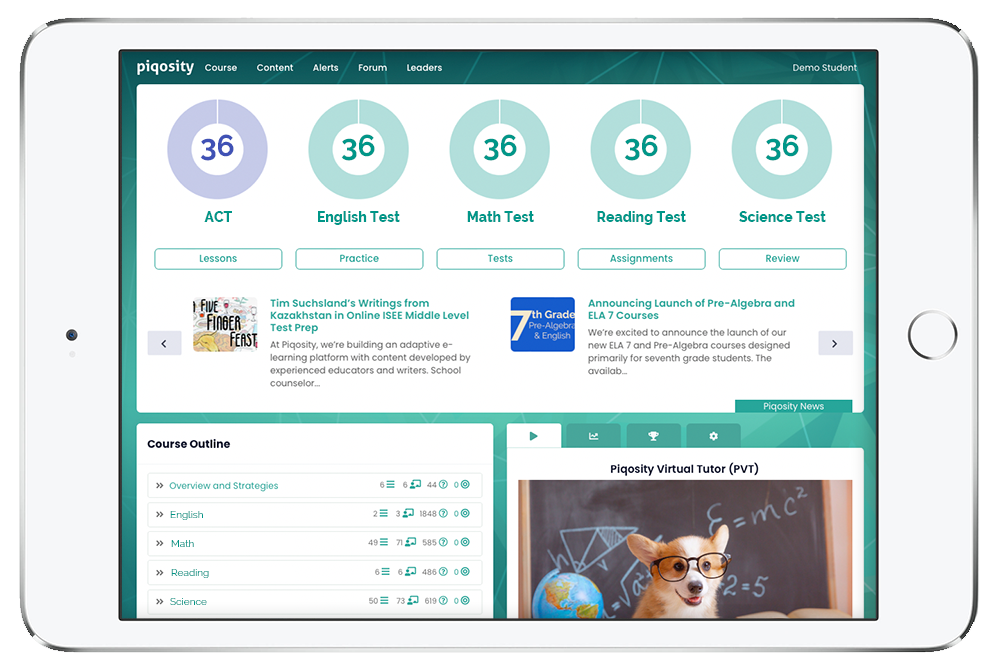Piqosity’s market-leading ACT prep course provides two, free ACT practice tests. Just like the actual ACT exam, these mock ACT tests are 215 questions long and immediately accessible:
- No credit card or phone number required
- Full-length and full-featured
- Self-scoring and auto-analyzing
The 2, free ACT practice tests are in addition to a no-cost mini diagnostic ACT test. The mini diagnostic is just 36 questions long, lasts 30 minutes, and is a great way for students to get a sense of the ACT’s difficulty and question types without having to commit a full 3.5 hours.
After students have worked through the ACT mini diagnostic and the two free, ACT practice tests, Piqosity’s College Prep Advanced plan offers an additional 10 tests, thousands of adaptive practice questions, and a Virtual Tutor to guide them step-by-step through the course:
- Mini Diagnostic ACT Test (free)
- 12 full-length ACT practice tests (2 free)
- 1200+ adaptive practice questions
- Piqosity Virtual Tutor with intelligent math remediation
- 15-hour premium video course
- Integration with our math courses through Pre-Calculus
- Integration with our English courses through ELA 11
ACT Test FAQs
Students should aim to take the ACT in the spring of their junior year of high school. Doing so gives students more time and opportunities to retake the exam and improve their score, if desired. Visit the ACT’s site to find an ACT test center location near you and to see the test dates available at that location.
Learn more about when to take the ACT and get this year’s ACT Test Dates here.
After you finish your ACT exam, you may wonder something along the lines of, “How long does it take to get ACT scores?”
Students who take the full ACT without the writing component should receive their scores roughly 2 weeks after their test dates. Students who take the ACT test without the writing component should receive their scores roughly 4 weeks after their test dates. You can view your test results by logging in to your MyACT account.
Note: There is an exception to the above guidelines; if you took your test in October or February, your test results may take up to 3-8 weeks to be released. For more information, please see the ACT page on score reporting windows.
It is worth stating that the ACT often does not always meet the aforementioned reporting deadlines. When planning your test dates, it’s better to be safe than sorry.
Yes, calculators are allowed on the ACT; graphic calculators are typically the most popular option. Check the ACT’s calculator policy to learn more about what calculators are allowed on the ACT.
In addition to an appropriate calculator, make sure you bring the following on test day:
- Your up-to-date admission ticket – Log into your MyAct account and print
- Acceptable photo ID – Typically your school ID, driver’s license, or passport
- At least two No. 2 pencils with erasers – Mechanical pencils are not permitted
- Face covering – During pandemic conditions
- Snacks and water – Avoid sugary drinks and snacks that will make you crash
For a comprehensive list of what to bring to the ACT — and what not to bring — see the ACT’s Bring This, Not That Checklist.
The biggest differences between the digital SAT and the ACT are:
- The SAT is purely computer-based whereas the ACT is offered both online and in paper
- The SAT is over 1 hour and 100 questions shorter than the ACT
- The SAT tested math is a lower-level, and there’s no science section compared to the ACT
These top three points seem like a clear win for the newly launched digital SAT. However, the digital SAT is so new (only launching in March 2024) that there are bound to be some pitfalls such as:
- You might prefer a paper test
- The extra time and questions on the ACT might give you more of an opportunity to do better
- You might simply prefer the way that ACT questions are structured
Our experience working with thousands of students over the last 20 years is that fewer than 5% of students will score significantly different on the SAT vs the ACT. We doubt this statistic will change with the digital SAT, so don’t fret if your school requires you to take one test over the other.
Both the digital SAT and the ACT test core concepts from Math, English, and Data Analysis. Even though the SAT doesn’t have a dedicated science test, it does have “quantitative evidence” questions which are not too dissimilar. They are both peer-normed tests (you’re scored in comparison to your classmates).
Top colleges like Harvard, Princeton, and Stanford could not care less which test you take (so long as you do well); both the ACT are nearly universally accepted at US colleges. The ACT and SAT go back and forth between which exam is technically more popular when counted by completed tests; depending on the year, the ACT and the SAT each test between 1.7 and 2.2 million college-bound seniors.
You can take the ACT up to 12 times, although most students stop at 2-3 retakes. We strongly encourage you to take your final ACT exam at least 6 weeks before your college application deadlines.
Keep in mind that early decision deadlines are typically November 1st and 15th, and standard deadlines generally begin in January. This means that if you are a senior applying for early decision, your last chance to take the ACT is typically the September administration date of your senior year; for standard deadlines, your last chance is typically the December administration date.
Again, keep in mind the ACT often does not always meet the aforementioned score reporting deadlines. When planning your test dates, it’s better to be safe than sorry.
Learn more about ACT Retakes here.
The ACT test is currently transitioning between an old ACT and the new, Enhanced ACT 2025 test.
The new, Enhanced ACT 2025 is 2 hours and 5 minutes long for mandatory sections:
New ACT 2025 Format
| Test Section | Number of Questions | Time Limit (minutes) | Time Per Question (seconds) |
| English | 50 | 35 | 42 |
| Math | 45 | 50 | ~67 |
| Reading | 36 | 40 | ~67 |
| Science (optional) | 40 | 40 | 60 |
| Essay (optional) | 1 | 40 | n/a |
| Totals: | 131 + 41 optional | 125 + 80 optional | n/a |
The old, Pre-2025 ACT without the writing test takes roughly 3 hours and 30 minutes to complete.
If students elect to write the optional essay, the test takes an additional 40 minutes to complete (so roughly 4 hours, including breaks):
- English: 75 questions (45 minutes)
- Math: 60 questions (60 minutes)
- Reading: 40 questions (35 minutes)
- Science: 40 questions (35 minutes)
- Writing: 1 prompt (40 minutes)
The American College Testing exam (ACT) is a standardized test required by many American colleges and universities during the admission process. Administered by ACT, Inc., the ACT is a pencil-and-paper, multiple-choice exam that consists of 4 required sections and 1 optional essay:
- English
- Math
- Reading
- Science
- Writing (1 optional prompt)
A strong score on the ACT can help open doors to more competitive colleges and universities. However, admissions boards review ACT scores alongside other parts of a college application, including GPA, performance in extracurricular activities, application essays, letters of recommendation, admissions interviews, and scores from other standardized tests (like the SAT).
What qualifies as a “good” score on the ACT depends on the goals of each particular student, the average scores required by their top choice of college or university, and the overall strength of a student’s application. In general, students are advised to aim for a composite score of at least 24 (which places you above the 74th percentile/better than ¾ of other test-takers). Keep in mind that a score of 24 may not be considered competitive enough for some schools.
What is an average ACT score?
The average ACT score changes every year. According to a 2021 ACT report on national norms, the average composite ACT score for the 2020-21 year was 20.7 (calculated using data from 2018-2020). Keep in mind that the effects of COVID-19 make it unwise to compare performance results between 2021 and previous years.
What is a perfect ACT score?
A perfect score on the ACT is a composite score of 36.
Learn more about this issue with our in-depth article exploring What is a Good ACT Score?
ACT preparation begins long before test day, and is primarily a reflection of the knowledge and skills a student learns over time in the classroom. However, test prep can help you review important concepts and, importantly, help test takers become more familiar and comfortable with the test itself.
Not sure how to study for the ACT? Piqosity provides up to 10 full-length practice tests and a multitude of other free resources, including a Mini Diagnostic Test, adaptive practice questions, tutorials and video lessons, and more, to help you achieve your ACT goals. Sign-up is free!
You may also benefit from exploring our FREE series of deep-dive blogs dedicated to each section of the ACT:
It costs $60 to take the full ACT with no writing component, and $85 to take it with the writing component. Fee Waivers are available to eligible low-income 11th- and 12th- graders. Registration changes and additional services may cost additional fees.
Learn more about ACT Costs & Fee Waivers here.



